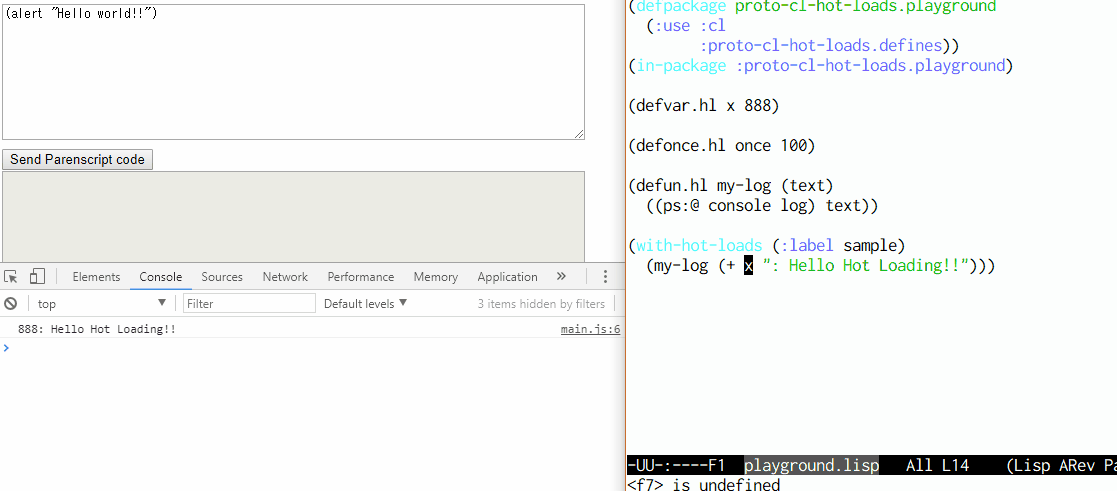Proto-Cl-Hot-Loads is a prototype of hot loads in Common Lisp. It is ispired by Figwheel of ClojureScript.
It tries the following simple idea.
When evaluating Common Lisp subset code for client,
- Compile it to JavaScript using Parenscript,
- Send the JS code to browser via WebSocket, and
- Evaluate it on browser by
eval()
The left of the screen is browser and the right is editor (Emacs + SLIME). When evaluating Parenscript code in the editor, the result is immediately reflected to the browser without reloading.
Please clone this to where quicklisp (asdf) can find. Then, load it by ql:quickload and start server. After that, you can access to http://localhost:5000 .
CL-USER> (ql:quickload :proto-cl-hot-loads)
CL-USER> (proto-cl-hot-loads:start :port 5000)After accessing, you can try hot loads using defvar.hl, defun.hl, defonce.hl, and with-hot-loads in src/playground.lisp (or use the package proto-cl-hot-loads.defines).
(Because this project is only a prototype, the interface is not so considered...)
defvar.hl
The defvar.hl is similar to defvar. For example, when evaluating the following (if you use Slime, press C-c C-c on the definition), var x = 100; is evaluated on browser.
(defvar.hl x 100)defun.hl
The defun.hl is similar to defun. For example, when evaluating the following, function hello(x) { alert("Hello " + x); }; is defined on browser.
(defun.hl hello (x)
(alert (+ "Hello " x)))defonce.hl
The defonce.hl is similar to defonce of Figwheel (Please refer "Writing reloadable code" in Figwheel's README for detail). For example, when evaluating the following, "var y = 200;" is evaluated on browser at the first time. But when re-evaluating as, for example, (defonce.hl y 300), y is not updated.
(defonce.hl y 200)with-hot-loads
The with-hot-loads is a basic macro of defxxx.hl macros. For example, when evaluating the following, an alert dialog with "Hello 300" is displayed on browser.
(with-hot-loads (:label some-label)
(hello (+ x y)))Finally, the defined symbols (labels) by with-hot-loads are output as JavaScript code to src/_js/main.js when accessed from browser.
For example, the following are defined in src/playground.lisp in default.
(defvar.hl x 888)
(defonce.hl once 100)
(defun.hl my-log (text)
((ps:@ console log) text))
(with-hot-loads (:label sample)
(my-log (+ x ": Hello Hot Loading!!")))So when you access to the server, src/_js/main.js is generated as the following and sended to browser.
var x = 888;
if (typeof x !== 'undefined') {
var once = 100;
};
function myLog(text) {
return console.log(text);
};
myLog(x + ': Hello Hot Loading!!');- eshamster (hamgoostar@gmail.com)
Copyright (c) 2018 eshamster (hamgoostar@gmail.com)
Licensed under the MIT License.
